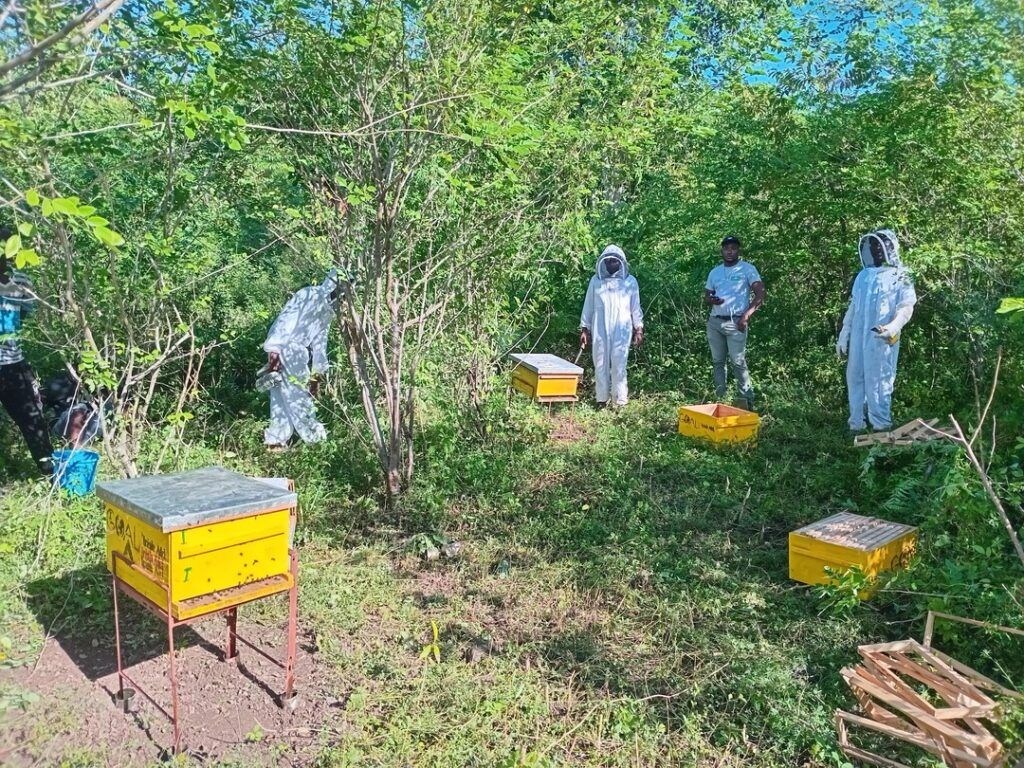 Stories
Stories
May 22, 2025 • 4 min read
Since 2019, GOAL Haiti’s Blue Economy Programme has focused on providing sustainable livelihoods to coastal communities in Grand’Anse. With generous funding from Irish Aid through the ICSP programme, GOAL launched a pilot project on apiculture in 2024, in partnership with Ayiti Apik, a local enterprise specializing in beekeeping. The initiative aims to offer an alternative source of income to local fishers, farmers, and mangrove-dependent communities, reducing the need to cut mangroves for charcoal.
Apiculture in Haiti is a small-scale, artisanal practice that holds significant economic potential. By training community members in modern beekeeping techniques and providing essential equipment such as hives and protective gear, GOAL has helped diversify income sources while promoting environmental conservation. This initiative is part of a broader strategy to strengthen economic resilience, preserve natural resources, and empower communities to manage their livelihoods sustainably.
Giles Francice’s Story: A Path to Economic Independence
Before participating in GOAL’s apiculture program, Giles Francice, a fisherman from Corail, faced severe economic challenges.
“Before GOAL’s intervention, I did not understand the true importance of mangroves. We used to cut them regularly for charcoal or cooking,” Jean-Louis recalls. “Fishing was also becoming more difficult. Without proper equipment, we couldn’t go far, and our catches were declining rapidly. I struggled to support my family, and the idea of starting a new business felt impossible.”
The turning point came when Giles Francice joined a training session on beekeeping organised by GOAL and Ayiti Apik.
“The training opened my eyes to the potential of apiculture,” he explains. “We learned how to set up hives, manage bees, and harvest honey sustainably. With the earnings from Cash for Work (CFW) activities through mangrove restoration, I was able to buy my own hives. Now, I not only catch fish but also harvest honey, which has a high demand in local markets.”
Today, Giles Francice manages several hives and sells honey within his community and nearby markets.
“I can now afford to send my children to school and cover healthcare expenses without worrying about the next fishing trip,” he shares proudly. “My income has almost doubled, and I can reinvest in both my fishing and beekeeping activities. This has changed my life and that of my family.”
Restoring Mangroves and Building Resilience
Giles Francice’s success is not just about increased income—it’s also about environmental stewardship.
“Since we started with the hives, we’ve seen how important it is to protect the mangroves,” he says.
“The bees need them, and so do we. We now collect mangrove propagules to sell and plant new trees instead of cutting them. This has helped restore areas that were badly damaged.”
The combination of apiculture and mangrove restoration has provided multiple layers of resilience for Giles Francice’s community—economic, environmental, and social.
“We have more than one way to earn a living now. Even when the sea is rough and we can’t fish, we can rely on honey production,” he explains.

GOAL ICSP-funded apiculture project, in partnership with Ayiti Apik.
Scaling Impact Through Irish Aid Support
Giles Francice’s story is just one example of the transformative impact of GOAL’s apiculture program. Thanks to support from Irish Aid, over 30 families in Bonbon, Corail, and Iles Cayemites have been trained via the pilot apiculture program. The results are promising:
- A 75% increase in household income among beneficiaries, reducing dependence on fishing and charcoal production.
- Over 1,500 mangrove propagules were planted as part of mangrove restoration efforts, directly supported by CFW and income from honey sales.
- Diversified income sources for fishers and their families, with 60% of participants reporting improved financial stability.
The apiculture initiative has not only reduced the pressure on mangroves but also strengthened food security by providing a reliable income source. By investing in alternative livelihoods, GOAL has shown that sustainable development is possible even in the most vulnerable coastal communities.
A Call for Continued Support
Looking to the future, Giles Francice has a clear vision:
“We want to expand our apiculture activities by increasing the number of hives and improving our production techniques. This would allow us to meet the growing demand for honey and create more jobs in our community.”
Giles Francice also emphasises the importance of preserving the environment.
“We’ve learned that protecting our mangroves is not just about conservation—it’s about ensuring our own survival. We hope that Irish Aid and GOAL can continue to support us in this journey.”
Continued funding and support are essential to sustain and expand these initiatives. By investing in alternative livelihoods like apiculture, donors such as Irish Aid can help break cycles of poverty and environmental degradation, ensuring a sustainable future for Haiti’s coastal communities. GOAL is also exploring the creation of village apiculture associations or cooperatives to better connect beekeepers with the apicultural market in Haiti and abroad. Additionally, we will look into the introduction or promotion of native fast-growing flowering plants, such as moringa or basil, to enhance honey production and biodiversity. These efforts aim to strengthen the resilience of local communities while fostering economic growth and environmental conservation.
In Jean-Louis’s words:
“Thanks to GOAL and Irish Aid, we now have hope for a better future—one where we can protect our resources and provide for our families.”
